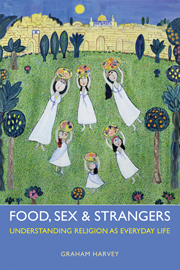Book contents
- Frontmatter
- Dedication
- Contents
- Preface
- 1 Of god and goats
- 2 Religioning elsewhere
- 3 Christianity is not a religion
- 4 Talking like a pirate
- 5 Real world
- 6 Doing violence with impunity
- 7 Respecting relations
- 8 Things full of meaning
- 9 Purity and pilgrimages
- 10 Enchantment and emplacement
- 11 Christians do religion like other people
- 12 Religion is etiquette in the real world
- Bubliography
- Index
5 - Real world
- Frontmatter
- Dedication
- Contents
- Preface
- 1 Of god and goats
- 2 Religioning elsewhere
- 3 Christianity is not a religion
- 4 Talking like a pirate
- 5 Real world
- 6 Doing violence with impunity
- 7 Respecting relations
- 8 Things full of meaning
- 9 Purity and pilgrimages
- 10 Enchantment and emplacement
- 11 Christians do religion like other people
- 12 Religion is etiquette in the real world
- Bubliography
- Index
Summary
I have learnt two things from listening in on the conversation of birds. First, although the larger-than-human world is full of conversation, most of it is not about humans. Second, although most of the conversation of the larger-than-human world is not about us, it does not ignore us. We are not central, but neither are we absent. Although other species do not share our anthropocentric obsession, we are not separate from them, or they from us. Birds and our other relations do not ignore us; we aren't alien to them, we live in the same place-communities, we co-evolved in the same world. Our acts are of some importance to them, but what we do and what is done to us are not the only significant happenings in the universe. Just as birds are not here for our benefit and use, nor are they particularly motivated by our every act and obsession. But sometimes they are.
We are part of the community of life, the society of Earth dwellers. We live alongside others of many species, all our lives are braided together, all our acts co-create the emergence of all that is, moment by moment. There is no environment separate from the lives we and all other species live. There is only ecology: the at-home acts of multiple related species. We are made, mattered, embodied, carnated perhaps, in the same way as other Earth evolved creatures.
- Type
- Chapter
- Information
- Food, Sex and StrangersUnderstanding Religion as Everyday Life, pp. 77 - 98Publisher: Acumen PublishingPrint publication year: 2013



